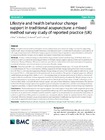| dc.contributor.author | Pinto, J. | |
| dc.contributor.author | Bradbury, K. | |
| dc.contributor.author | Newell, Dave | |
| dc.contributor.author | Bishop, F. L. | |
| dc.date.accessioned | 2024-01-25T11:49:02Z | |
| dc.date.available | 2024-01-25T11:49:02Z | |
| dc.date.issued | 2022-09-21 | |
| dc.identifier.citation | Pinto, J., Bradbury, K., Newell, D., & Bishop, F. L. (2022). Lifestyle and health behaviour change support in traditional acupuncture: a mixed method survey study of reported practice (UK). BMC Complementary Medicine and Therapies, 22(1), 248. https://doi.org/10.1186/s12906-022-03719-6 | en |
| dc.identifier.issn | 2662-7671 | |
| dc.identifier.uri | https://aecc.archive.knowledgearc.net/handle/123456789/247 | |
| dc.description | Available under License - Creative Commons Attribution: https://creativecommons.org/licenses/by/4.0/ | en |
| dc.description.abstract | Aims: Complementary medicine therapists such as traditional acupuncturists are a large resource for supporting public health targets to improve health behaviours. Our objectives were to determine the prevalence and patterns of UK acupuncturists’ provision of lifestyle change support, test theory-based hypotheses about facilitators and barriers to supporting lifestyle changes and to explore associated characteristics and attitudes.
Methods: A mixed methods design in which British Acupuncture Council members (Sept 2019-April 2020) completed an online questionnaire assessing prevalence of lifestyle change support, typical patterns across patients and behaviours, Theory of Planned Behaviour constructs, practitioner characteristics and open-text responses regarding additional behaviours and clinical decisions to introduce lifestyle change.
Results: Three hundred fifty-two traditional acupuncturists participated (Mean age = 51.5 years, SD 9.9; 81.8% (n = 288) female). 57.7% (n = 203) reported offering support for lifestyle change during their most recent consultation. 91.7% (n = 323) reported supporting lifestyle change ‘always or most of the time’ for patients with chronic conditions and 67.9% (n = 239) reported this for patients with acute conditions. The pattern of typical support for different health behaviours ranged from 44.6% (n = 157) for smoking reduction (acute conditions) to 95.2% (n = 335) for diet support (chronic conditions). A linear regression model found that frequency of support for lifestyle change in acute patients was predicted by acupuncturists’ attitudes to both clinical role and importance of health behaviours, confidence in their ability to provide lifestyle change support and use of fewer behaviour change techniques. The decision to first offer lifestyle change support was guided by perceived patient receptiveness, whether presenting condition/diagnosis were likely to improve with lifestyle change and whether a strong therapeutic relationship was established.
Conclusions: Traditional acupuncturists’ reports suggest their work supports key public health targets for promoting healthy behaviours. Less frequent support for alcohol/smoking may reflect user characteristics but may suggest training needs for acupuncturists. Increase could be made for support in acute presentations, however the importance of patient receptiveness, linking advice to condition, and therapeutic alliance should be explored further. There may be important differences between acupuncture practice and mainstream healthcare (e.g. high level of contact, longer visits, holistic approach) which impact mechanisms of action of behaviour change. | en |
| dc.language.iso | en | en |
| dc.publisher | BMC Complementary Medicine and Therapies | en |
| dc.subject | Health behaviour | en |
| dc.subject | Lifestyle | en |
| dc.subject | Acupuncture | en |
| dc.subject | Behaviour change | en |
| dc.subject | Health promotion | en |
| dc.subject | Self-care | en |
| dc.title | Lifestyle and health behaviour change support in traditional acupuncture: a mixed method survey study of reported practice (UK) | en |
| dc.type | Article | en |
| dc.identifier.doi | https://doi.org/10.1186/s12906-022-03719-6 | |
